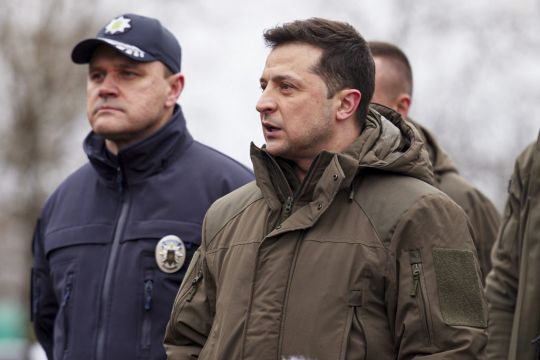Ukraine’s president has played down intensified warnings of a possible Russian invasion within days, saying he has yet to see convincing evidence.
Volodymyr Zelensky’s comments came even as the US warned of more Russian troops pressing closer to Ukraine’s borders and some airlines cancelled or diverted flights to the country.
US President Joe Biden spoke for about 50 minutes on Sunday with Ukrainian President Volodymyr Zelensky and renewed promises of what the West says will be tough economic sanctions against Moscow and a Nato build-up in the event of “any further Russian aggression” against Ukraine, the White House said.

They agreed to pursue both deterrence and diplomacy in the crisis, it added.
The US updated its estimate for how many Russian forces were now staged near Ukraine’s borders to more than 130,000, up from the 100,000 the US has cited publicly in previous weeks.
The Ukrainian leader’s repeated statements urging calm among his people – while Russian forces surround his country on three sides in what Russia insists are military exercises – grew this weekend, with Mr Zelensky questioning strident warnings from US officials in recent days that Russia could be planning to invade as soon as the middle of next week.
While Mr Zelensky has urged against panic that he fears could undermine Ukraine’s economy, he and his civilian and military leaders are also preparing defences, soliciting and receiving a flow of arms from the US and other Nato members.
Mr Zelensky wore olive-coloured military clothing at a drill with tanks and helicopters near Ukraine’s border with Russian-annexed Crimea this weekend.

In the nearby city of Kalanchak, some expressed disbelief that Russian President Vladimir Putin would really send the troops poised along Ukraine’s borders rolling into the country.
“I don’t believe Russia will attack us,” resident Boris Cherepenko said.
“I have friends in Sakhalin, in Krasnodar,” he added, naming Russian locations. “I don’t believe it.”
The US picked up intelligence that Russia was looking at Wednesday as a target date, according to a United States official familiar with the findings.
“We’re not going to give Russia the opportunity to conduct a surprise here, to spring something on Ukraine or the world,” Jake Sullivan, the US national security adviser, told CNN on Sunday, about the United States’ warnings.
“We are going to make sure that we are laying out for the world what we see as transparently and plainly as we possibly can,” he said.
The US has largely not made public the evidence it says is underlying its most specific warnings on possible Russian planning or timing.
The Russians have deployed missile, air, naval and special operations forces, as well as supplies to sustain an invasion.
This week, Russia moved six amphibious assault ships into the Black Sea, augmenting its capability to land on the coast.
Mr Zelensky’s comments this weekend indicated frustration at the warnings from Washington, as he tried to minimise damage to Ukraine’s economy during the crisis.
“We understand all the risks, we understand that there are risks,” he said in a live broadcast.
“If you, or anyone else, has additional information regarding a 100% Russian invasion starting on the 16th, please forward that information to us.”
In an hour-long call on Saturday with Mr Putin, Mr Biden said an invasion of Ukraine would cause “widespread human suffering” and that the West was committed to diplomacy to end the crisis but “equally prepared for other scenarios”, the White House said.

It offered no suggestion that the call had diminished the threat of an imminent war in Europe.
Reflecting the West’s concerns, Dutch airline KLM has cancelled flights to Ukraine until further notice, the company said.
And the Ukrainian charter airline SkyUp said on Sunday that its flight from Madeira, Portugal, to Kyiv was diverted to the Moldovan capital of Chisinau after the plane’s Irish lessor said it was banning flights in Ukrainian airspace.
Ukrainian presidential spokesman Serhii Nykyforov told The Associated Press that Ukraine has not closed its airspace.
But Ukraine’s air traffic safety agency Ukraerorukh issued a statement declaring the airspace over the Black Sea to be a “zone of potential danger” and recommended that planes avoid flying over the sea between February 14 and 19.
The Putin/Biden conversation, following a call between Mr Putin and French President Emmanuel Macron earlier in the day, came at a critical moment for what has become the biggest security crisis between Russia and the West since the Cold War.







